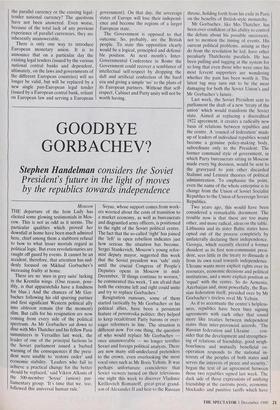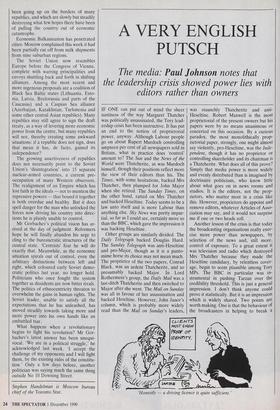GOODBYE GORBACHEV?
President's future in the light of moves by the republics towards independence
Moscow THE departure of the Iron Lady has elicited some glowing testimonials in Mos- cow. This is not as odd as it seems. The particular qualities which proved her downfall at home have been much admired here, chief among them a stubborn refusal to bow to what lesser mortals regard as political logic. But even revolutionaries are caught off guard by events. It cannot be an accident, therefore, that attention has sud- denly focused on Mikhail Gorbachev's increasing frailty at home.
There are no 'men in grey suits' lurking in the Kremlin wings. (One reason, poss- ibly, is that apparatchiks have a fondness for blue.) And the chances of Mr Gor- bachev following his old sparring partner and first significant Western political ally into oblivion remain (for the moment) slim. But calls for his resignation are now coming from every side of the political spectrum. As Mr Gorbachev sat down to dine with Mrs Thatcher and his fellow Paris summiteers in Versailles last week, the leader of one of the principal factions in the Soviet parliament issued a barbed warning of the consequences if the presi- dent were unable to 'restore order' and economic stability. 'Leaders who fail to achieve a practical change for the better should be replaced,' said Viktor. Alksnis of the 500-member 'Soyuz' (union) par- liamentary group. 'It's time that we. too, followed this universal human rule.' Soyuz, whose support comes from work- ers worried about the costs of transition to a market economy, as well as bureaucrats and disgruntled army officers, is positioned to the right of the Soviet political centre. The fact that the so-called 'right' has joined the 'left' in open rebellion indicates just how serious the situation has become. Sergei Stankevich, Moscow's young refor- mist deputy mayor, suggested this week that the Soviet president was 'safe' only until the crucial Congress of People's Deputies opens in Moscow in mid- December. 'If things continue to worsen,' he commented this week, 'I am afraid that both the extreme left and right could unite and try to replace Gorbachev.'
Resignation rumours, some of them started tactically by Mr Gorbachev or his political allies, have been a persistent feature of perestroika politics: they helped to keep recalcitrant Party barons or over- eager reformers in line. The situation is different now. For one thing, the question of who would replace Mr Gorbachev once unanswerable — no longer terrifies Soviet and foreign political analysts. There are now many still-undeclared pretenders to the crown, even overlooking the most vocal ones such as Mr Boris Yeltsin. It was perhaps unfortunate coincidence that Soviet viewers turned on their televisions one night this week to discover Vladimir Kirillovitch Romanoff, great-great grand- son of Alexander II and heir to the Russian
throne, holding forth from his exile in Paris on the benefits of British-style monarchy.
Mr Gorbachev, like Mrs Thatcher, has been over-confident of his ability to control the debate about his possible successors, not to mention the timing of events. His current political problems, arising as they do from the revolution he led. have other peculiarly Thatcherite parallels. He has been pulling and tugging at the system for so long that even those who were once his most fervent supporters are wondering whether the pain has been worth it. The latest tug may turn out to he the most damaging for both the Soviet Union's and Mr Gorbachev's future.
Last week, the Soviet President sent to parliament the draft of a new 'treaty of the union' which would transform the Soviet state. Aimed at replacing a discredited 1922 agreement, it creates a radically new basis of relations between republics and the centre. A 'council of federation' made up of leaders of individual republics would become a genuine policy-making body, subordinate only to the President. The former command style of government, in which Party bureaucrats sitting in Moscow made every big decision, would be sent to the graveyard to join other discarded Stalinist and Leninist theories of political administration. To emphasise the point, even the name of the whole enterprise is to change from the Union of Soviet Socialist Republics to the Union of Sovereign Soviet Republics.
Two years ago, this would have been considered a remarkable document. The trouble now is that there are too many other, and more radical, ideas on the table. Lithuania and its sister Baltic states have opted out of the process completely by unilaterally declaring their independence. Georgia, which recently elected a former dissident as its first non-communist presi- dent, sees little in the treaty to dissuade it from its own road towards independence. Ukraine wants more explicit rights over its resources, economic decisions and political institutions, and a more explicit position as 'equal' with the centre. So do Armenia, Azerbaijan and, most powerfully, the Rus- sian federation itself, presided over by Mr Gorbachev's tireless rival Mr Yeltsin.
As if to accentuate the centre's helpless- ness, republics have been busy signing agreements with each other that sound more like treaties between independent states than inter-provincial accords. 'The Russian federation and Ukraine . . . con- sider that the development and strengthen- ing of relations of friendship, good neigh- bourliness and mutually beneficial co- operation responds to the national in- terests of the peoples of both states and serves the interests of peace and security,' began the text of an agreement between those two republics signed last week. The dark side of those expressions of undying friendship at the customs posts, economic blockades and punitive tariffs which have been going up on the borders of many republics, and which are slowly but steadily destroying what few hopes there have been of pulling the country out of economic catastrophe.
Economic Balkanisation has penetrated cities: Moscow complained this week it had been partially cut off from milk shipments from nine suburban regions.
The Soviet Union now resembles Europe before the Congress of Vienna, complete with warring principalities and envoys shuttling back and forth in shifting alliances. Among the most recent and more ingenious proposals are a coalition of Black Sea Baltic states (Lithuania, Esto- nia, Latvia, Byelorussia and parts of the Caucasus) and a Caspian Sea alliance (Azerbaijan, Kazakhstan, Turkmenia and some other central Asian republics). Many republics may still agree to sign the draft treaty, as a way of levering more economic power from the centre, but many republics will not, thereby creating some awkward situations: if a republic does not sign, does that mean it has, de facto, gained its independence?
The growing assertiveness of republics does not necessarily point to the Soviet Union's 'disintegration' into 15 separate nuclear-armed countries, a current pre- occupation of many Western observers. The realignment of an Empire which has lost faith in the ideals — not to mention the repressive powers — that bound it together is both overdue and healthy. But it does spell danger for the man who unlocked the forces now driving his country into direc- tions he is plainly unable to control.
Mr Gorbachev's political vision has ar- rived at the day of judgment. Reformers hope he will finally abandon his urge to cling to the bureaucratic structures of the central state. 'Centrists' fear he will do exactly that. Meanwhile, as the economic situation spirals out of control, even the arbitrary distinctions between left and right, which coloured early Soviet demo- cratic politics last year, no longer hold. Politicians who once fought the system together as dissidents are now bitter rivals. The politics of ethnocentricity threaten to overwhelm the gains in human rights. The Soviet leader, unable to satisfy all the expectations that he has unleashed, has moved steadily towards taking more and more power into his own hands like an embattled tsar.
What happens when a revolutionary begins to fight his revolution? Mr Gor- bachev's latest answer has been unequi- vocal. 'We are in a political struggle,' he acknowledged last week. 'I accept the challenge of my opponents and I will fight them, by the existing rules of the constitu- tion.' Only a few days before, another politician was saying much the same thing outside No 10 Downing Street.
Stephen Handelman is Moscow bureau chief of the Toronto Star.











































































 Previous page
Previous page